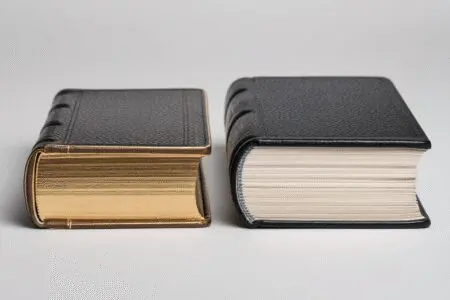I remember the first time I walked into a United Methodist Church. I’d grown up in a different tradition, one where the King James Version was the Bible, full stop. Seeing a different book in the pew rack felt… odd. It looked like a Bible, felt like a Bible, but the words on the page were just slightly different. Smoother, maybe? It sent me down a rabbit hole, asking a question that seems simple but has a surprisingly deep answer: What Bible do Methodists use?
It turns out, there isn’t a single, mandated “Methodist Bible.” Instead, there’s a preferred translation for official use, but a whole world of options that people use for their personal study. It’s less about a rigid rule and more about a thoughtful approach to scripture. This guide is the result of my deep dive, written for anyone who, like me, is curious about the details.
More in Bible Category
Key Takeaways Right Up Front
For those who just want the fast answer, here it is:
- The “Unofficial Official” Bible: The United Methodist Church (UMC) overwhelmingly recommends and uses the New Revised Standard Version (NRSV) for its worship services, curriculum, and theological resources.
- Why the NRSV? It’s prized for its scholarly accuracy, drawing from the best available ancient manuscripts. It also uses gender-inclusive language for humanity where the original text intended it, which aligns with modern Methodist values.
- No Single Mandate: The UMC does not forbid people from using other translations. You’ll find Methodists reading the NIV, KJV, The Message, and many others for their personal devotions.
- It’s About How, Not Just What: More important than the specific translation is the Methodist way of interpreting scripture, which involves tradition, reason, and personal experience alongside the text itself.
So, Why Do Most Methodist Churches Have the NRSV in the Pews?
If you want to know what Bible Methodists use, the NRSV is the place to start. When the UMC develops its official worship resources, Sunday school materials, or other publications, this is the version they turn to.
I once asked a Methodist pastor why this specific version was so prevalent. He explained that the denomination puts a huge emphasis on scholarship. They want a translation that reflects the most up-to-date understanding of the ancient Greek and Hebrew texts. The NRSV, first published in 1989, is a product of that intense academic rigor. It stands on the shoulders of the Revised Standard Version (RSV) and, before that, the King James Version (KJV), so it has a solid lineage.
But it’s not just about being academic. The NRSV translators made a conscious effort to be “as literal as possible, as free as necessary.” This means they tried to stick close to the original wording and structure, which is great for deep study, but they weren’t afraid to smooth things out to make sense in modern English.
What’s This I Hear About Inclusive Language?
One of the defining features of the NRSV is its use of inclusive language. This can be a point of confusion, so let’s break it down. It doesn’t mean changing God’s gender or altering the core message.
Instead, it means being more precise about humanity. For instance, where an older translation might say “brothers” to refer to a mixed group of men and women, the NRSV will often use “brothers and sisters” or “friends.” When a passage in the original language is clearly talking about all people, the NRSV avoids using exclusively male terms like “man” or “mankind.”
For the UMC, this is a matter of both accuracy and hospitality. It’s about making sure the scripture speaks to everyone in the congregation, reflecting the belief that all people are included in God’s story.
But My Methodist Grandma Swears by Her King James Bible. What Gives?
This is a really common point of connection for a lot of folks. For centuries, the King James Version was the definitive English Bible for nearly all Protestant denominations, Methodism included. Its soaring, poetic language has shaped the English language itself.
Think about it:
- “The salt of the earth”
- “A wolf in sheep’s clothing”
- “The spirit is willing, but the flesh is weak”
All of these phrases come directly from the KJV. It’s deeply woven into our cultural and spiritual DNA. John Wesley, the founder of the Methodist movement, certainly used the King James Version. His sermons and writings are filled with its language.
So, why did the UMC leadership shift its preference to the NRSV? It wasn’t because the KJV is “bad.” It was primarily due to advancements in biblical scholarship. Since the KJV was translated in 1611, archaeologists and scholars have discovered much older and more reliable manuscript copies of the biblical texts. The NRSV is based on these more ancient sources, giving it a higher degree of textual accuracy. Plus, the English language has changed a lot in 400 years; words like “thee,” “thou,” and “suffer the little children” can be a barrier for modern readers.
Many Methodists, especially from older generations, still cherish their KJV Bibles. They’re family heirlooms, filled with underlined verses and notes in the margins. There’s an emotional and historical weight to them that is irreplaceable. The UMC respects that deeply; the preference for the NRSV in official contexts doesn’t erase the KJV’s legacy.
What About Easier-to-Read Bibles? Are They Welcome?
Absolutely. This is where the conversation shifts from the pulpit to the living room. While the NRSV is the standard for official church business due to its academic precision, many Methodists prefer something different for their daily reading. This is where you’ll see a lot more variety.
The NIV: The Friendly Neighbor of Bibles
The New International Version (NIV) is probably the most popular Bible translation in the United States, and you’ll find plenty of Methodists who love it. I used one for years. The NIV was translated with a different philosophy than the NRSV. It’s a “dynamic equivalent” translation, which is a fancy way of saying it’s focused on “thought-for-thought” rather than “word-for-word.”
The goal of the NIV is readability. The translators asked themselves, “What was the original author trying to say, and how can we say that clearly in modern English?” This makes it incredibly accessible, especially for someone new to the Bible.
The Message: A Whole Different Approach
Then you have paraphrases like The Message by Eugene Peterson. This isn’t a translation in the traditional sense. Peterson, a pastor and scholar, set out to rephrase the entire Bible in the kind of contemporary language you’d use in a letter to a friend.
It can be a fantastic way to see a familiar passage with fresh eyes. Reading a psalm from The Message can feel less like ancient poetry and more like a heartfelt, modern prayer. However, because it’s one person’s interpretation and takes so many liberties with the text, you wouldn’t use it for a deep, academic study or as the basis for a sermon. It’s a companion, not a primary text.
How Do Methodists Actually Choose a Bible for Themselves?
This gets to the heart of the Methodist approach. It’s less about being told what to do and more about being equipped to make a thoughtful choice. The UMC trusts its members to be active participants in their faith.
Is It Just About What the Pastor Recommends?
A Methodist pastor will almost certainly encourage the use of the NRSV for church-sponsored Bible studies. Why? Because it ensures everyone is literally on the same page. It’s frustrating to have a group discussion when everyone’s Bible has slightly different wording for the same verse. Using the NRSV as a baseline creates a shared language for the group.
However, for personal reading, that same pastor will likely say, “The best Bible translation is the one you’ll actually read.” They would rather have someone engage with scripture through an “easier” translation like the NIV than have a “more accurate” NRSV collecting dust on a shelf. The goal is engagement, not just academic perfection.
Does the “Right” Bible Change Depending on the Situation?
For many people, yes. It’s not uncommon for a devout Methodist to use different Bibles for different purposes. I’ve sort of fallen into this camp myself.
- For Group Study: I’ll bring my NRSV Study Bible. The detailed notes, maps, and essays in a good study Bible are invaluable for digging into historical context. The HarperCollins Study Bible, which uses the NRSV text, is a classic for a reason and highly respected in academic circles. For anyone serious about understanding the Bible’s background, I can’t recommend it enough. You can find out more about these academic approaches through resources like the Candler School of Theology at Emory University, a prominent Methodist seminary.
- For Daily Reading: I might use an NIV or even a mobile app that lets me switch between versions. Sometimes, I just want the text to wash over me without getting bogged down in footnotes. The goal is spiritual reflection, not academic dissection.
- For a Fresh Perspective: When a passage feels stale, I might pull up The Message online just to hear it in a completely different voice.
This isn’t seen as inconsistent; it’s seen as using the right tool for the right job.
The Secret Key: It’s Not Just the Book, It’s the Method
Here’s the thing I really didn’t understand until I spent more time around Methodists. The question “What Bible do Methodists use?” is only the first step. The more important question is, “How do Methodists read the Bible?”
They have a unique and, I think, incredibly practical framework for interpretation that comes from John Wesley himself. It’s often called the Wesleyan Quadrilateral. That sounds super academic, but the idea is simple. It’s like a four-legged stool. To have a stable, balanced understanding of faith, you need all four legs.
The Four Legs of the Stool
- Scripture: This is the starting point and the main source of authority. The Bible is the primary witness to God’s love and work in the world. Everything starts here.
- Tradition: Methodists don’t believe they’re inventing Christianity from scratch. They look back at 2,000 years of thought, creeds, and worship from the global Church. Tradition helps guard against wild, individual interpretations that are out of sync with the historic faith.
- Reason: This is a big one. Methodists believe that God gave us minds and expects us to use them. They read the Bible with critical thinking, asking questions about the historical context, the literary style, and the scientific understanding of the world. Faith and reason are seen as partners, not enemies. You’re encouraged to ask the tough questions.
- Experience: This is the most personal part. Methodists believe that God is still active in the world and in our lives. They bring their own personal and communal experiences of God’s grace to the text. Does an interpretation lead to more love, justice, and mercy in the real world? That’s a key test.
So, Methodists Don’t Take Everything Literally?
Exactly. The Wesleyan Quadrilateral provides a way to read the Bible thoughtfully, not just literally. It allows a Methodist to appreciate the poetry of Genesis 1 without feeling like they have to reject the science of evolution. It allows them to understand the cultural context of a passage in Leviticus without feeling bound to apply it in the same way today.
I found this approach incredibly refreshing. It gave me permission to bring my whole self—my doubts, my questions, my real-world knowledge—to my faith. It’s an approach that respects the Bible deeply but refuses to turn it into a flat, simplistic rulebook. It’s a living document that we engage with using all the tools God has given us.
So, What’s the Real Answer?
After all this, what Bible do Methodists use? They use the NRSV as their trusted, scholarly guide for official worship and study. They use the KJV to connect with their rich heritage. They use the NIV for its welcoming accessibility. They use The Message for a fresh spark of insight.
But more than that, they use a Bible that is open, underlined, and coffee-stained. They use a Bible that is read in community and wrestled with in private. They use Scripture as the starting point of a conversation with God, one that is informed by tradition, guided by reason, and confirmed by experience.
The specific translation matters, but only because it’s a gateway to that deeper engagement. The real “Methodist Bible” is any version that helps a person connect more deeply with God and love their neighbor more fully. And that’s a pretty good answer.
Frequently Asked Questions – What Bible Do Methodists Use

How do Methodists typically study and read the Bible?
Methodists emphasize group-based Bible study through small groups and classes, following John Wesley’s tradition. They aim to apply biblical truths to real life, fostering social holiness by encouraging personal and social application of Scripture.
Do Methodists consider the Apocrypha part of their Bible?
Methodists generally do not include the Apocrypha as part of God’s Word, aligning with Martin Luther’s view. They see these books as useful for historical and personal reflection but not for establishing doctrine.
Why are different Bible versions used in Methodist churches today?
Different Methodist churches and pastors choose Bible translations based on their values of tradition, reason, and experience. Some prefer the NRSV for its scholarly and inclusive qualities, while others may use the Common English Bible (CEB) or the New International Version (NIV) for readability and approachability.
How did John Wesley influence the choice of Bible translations for Methodists?
John Wesley primarily used the King James Version (KJV) but also worked on his own translation and notes to make the Bible more understandable, emphasizing the importance of clarity and study. His respect for Scripture and desire for accessible understanding influenced Methodist approaches to Bible translation.
What Bible do Methodists primarily use in their official church publications?
Methodists primarily use the New Revised Standard Version (NRSV) for their official church books, including hymnals and worship materials, because of its scholarly accuracy, clarity, and inclusive language.




